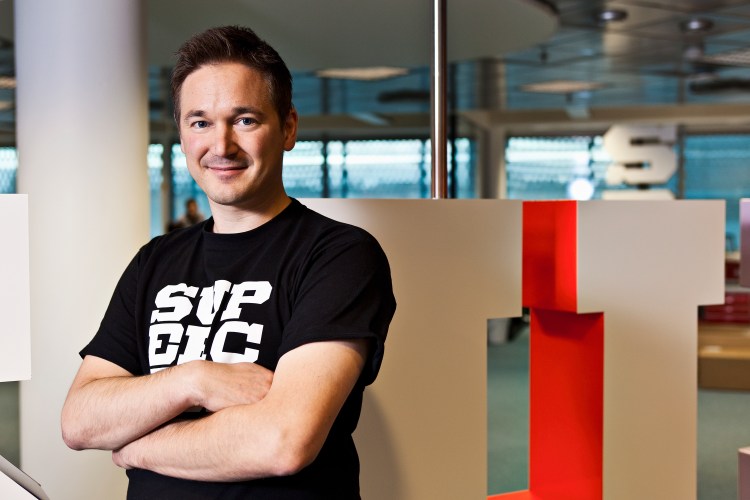Disclosure: The organizers of Slush paid my way to Helsinki. Our reporting remains objective. This is part two of our interview with Supercell. Part one ran Monday.
HELSINKI — Housed in an abandoned Nokia research building, Supercell’s headquarters is a lesson in itself. The Finnish company has become rich off its Clash of Clans and Hay Day mobile games. It sold 51 percent of its Helsinki-based company to Japan’s SoftBank and GungHo Entertainment for $1.53 billion. That makes Supercell worth about $3 billion, or more than Zynga, the social gaming giant with 2,200 employees.
The deal was one of the most interesting in gaming history. But all glory is fleeting, as World War II general George Patton once said. What guarantee does SoftBank have that Supercell’s next game will be a hit? We caught up with Ilkka Paananen, the chief executive of Supercell, with a media group attending the Slush conference in Helsinki.
Paananen says the company did that deal not as its end game but to secure stability for good and to set about its quest of “making history” in the entertainment business. Paananen hopes Supercell will make a lasting impact on the game business in the same way that companies such as Disney and Nintendo have done — and in an environment in which more than 1.2 billion people play games.
Here’s an edited transcript of our group interview with Paananen. The pictures are from a tour of Supercell’s headquarters, and we’ve included a photo gallery at the end.
Question: When we can expect the next game from Supercell?
Paananen: [Laughs] When it’s ready. At Supercell the teams have control. One of the things we believe is that it makes sense to test a game as early as possible. You might have read that we’re testing a certain game right now in the Canadian App Store, Boom Beach. Our model works, as I said, that it’s up to the teams, and then it’s up to the players. In the case of Boom Beach, if the players like it, we’ll launch it globally. If they don’t, we’ll kill it. It’s that simple. There are other teams working on other games, and the same rules apply. At some point those teams will launch something to beta. If it works, great. They’ll proceed to a global launch. If it doesn’t work they’ll kill it and move on to the next thing.
Question: Are you a serial entrepreneur? How many companies have you worked with?
Paananen: I guess I could call myself that. A few of my friends and I founded our first games company back in 2000. The company was called Sumea. Then we grew to about 40 people and sold to a company called Digital Chocolate in 2004. I worked almost six years as the president of Digital Chocolate, and left in early 2010. I took a few months off and then was lucky enough to be one of the founders of Supercell a bit later on.
Question: What were the most important things you learned, going from company to company and environment to environment?
Paananen: The number one thing was that it’s all about the talent. It’s all about the creative talent. Unless you have the best talent—That’s all that counts. If you have the best talent, sooner or later the best games will follow.
The other thing I learned is to try to minimize the bureaucracy in the process. A lot of companies have these game review meetings, where teams bring their games in front of a committee that gives them feedback. It takes a lot of time. In the nightmare scenario the team spends more time pitching for the committee and preparing for the pitch than they spend on the game. There’s none of that at Supercell. That’s why even I can’t go kill a game. One of my explicit goals is to make myself the least powerful CEO in the world. I see my role and the role of the management is as an enabler so the best people can focus on their work. We try to create the best possible environment for them.
Games is a people business and only a people business. That’s the number one learning I found. The number two learning was the value of small, of keeping things simple. We’re still a very small company compared to many of our competitors, and we want to keep it that way. Working at a smaller company is just a lot more fun. When working is more fun you make better games. It’s as simple as that. As a side benefit, when you’re small you don’t need the layers of management and bureaucracy and process that everybody hates.
Question: What’s your optimal team size? What sort of planning and management do you use around each of those teams and the games they’re working on?
Paananen: Clash of Clans was developed from the start by five people. We try to keep the new game teams as small as possible – anywhere from five to perhaps seven or eight people per team. The live game teams, because we’re serving millions of users every day, for practical purposes they need to be bigger. But even then the size stays between about 10 and 15.




